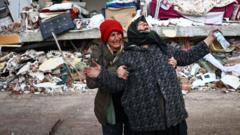### Summary: On June 15, 2025, Israel executed unprecedented daytime airstrikes in Tehran, igniting further hostilities as Iran retaliated with missile fire on Israeli cities. The escalating conflict has raised international concerns of a broader war while negotiations over Iran's nuclear program remain stalled.
### Title: Escalation in Israel-Iran Conflict: Daytime Airstrikes and Missiles Mark Intensified Violence

### Title: Escalation in Israel-Iran Conflict: Daytime Airstrikes and Missiles Mark Intensified Violence
### Description: Israel launched a series of sudden airstrikes in Iran, prompting a wave of retaliation with missiles aimed at various Israeli targets, marking a significant escalation in ongoing tensions.
---
On June 15, 2025, the conflict between Israel and Iran saw a dangerous escalation as Israeli forces conducted daylight airstrikes on the Iranian capital of Tehran, targeting critical infrastructure. This development came amidst a backdrop of intense military exchanges following a week of violence, during which both nations suffered significant casualties and damage.
Reports indicate that the Israeli airstrikes focused on essential sites, including oil refineries and military facilities, igniting flames and towering smoke across sections of the city. Eyewitness accounts describe widespread destruction and a state of panic among residents who were forced to take immediate shelter. Iran's state media has released imagery showing the aftermath of these strikes, highlighting damaged residential areas and significant fire at Tehran's pivotal Shahran fuel depot.
In retaliation, Iranian forces unleashed a wave of ballistic missiles targeting Israeli urban centers, with some missiles evading the country's advanced air defense systems. Casualty reports reveal at least a dozen fatalities and numerous injuries on both sides; specifically, at least 70 individuals have died in the ongoing barrage of rocket fire exchanged since the onslaught began.
Israeli military officials assert that their extensive campaign, which now includes over 250 targeted strikes inside Iran, aims to diminish Tehran's military capabilities and disrupt its ongoing nuclear ambitions. IDF spokesperson Brig. Gen. Effie Defrin emphasized that operations would continue unabated, indicating an "expanding scope" that includes strikes on Iran's energy and military sectors.
Additionally, amidst this chaotic backdrop, crucial diplomatic discussions regarding Iran's nuclear program were abruptly halted, signaling a challenge to achieving any form of reconciliation. The international community is increasingly concerned that these military escalations could engulf other regional allies, potentially drawing in global powers like the United States.
The mounting fears of a prolonged conflict are palpable, with leaders on both sides expressing an unwillingness to deescalate. Iran's military has vowed to escalate its attacks if Israeli operations do not cease, while Israel continues to broaden its offensive on Iranian military and energy infrastructure.
As civilians in both nations brace for further violence, analysts and officials warn that the situation, if unchecked, could lead to a broader regional war, further complicating an already volatile landscape in the Middle East.
On June 15, 2025, the conflict between Israel and Iran saw a dangerous escalation as Israeli forces conducted daylight airstrikes on the Iranian capital of Tehran, targeting critical infrastructure. This development came amidst a backdrop of intense military exchanges following a week of violence, during which both nations suffered significant casualties and damage.
Reports indicate that the Israeli airstrikes focused on essential sites, including oil refineries and military facilities, igniting flames and towering smoke across sections of the city. Eyewitness accounts describe widespread destruction and a state of panic among residents who were forced to take immediate shelter. Iran's state media has released imagery showing the aftermath of these strikes, highlighting damaged residential areas and significant fire at Tehran's pivotal Shahran fuel depot.
In retaliation, Iranian forces unleashed a wave of ballistic missiles targeting Israeli urban centers, with some missiles evading the country's advanced air defense systems. Casualty reports reveal at least a dozen fatalities and numerous injuries on both sides; specifically, at least 70 individuals have died in the ongoing barrage of rocket fire exchanged since the onslaught began.
Israeli military officials assert that their extensive campaign, which now includes over 250 targeted strikes inside Iran, aims to diminish Tehran's military capabilities and disrupt its ongoing nuclear ambitions. IDF spokesperson Brig. Gen. Effie Defrin emphasized that operations would continue unabated, indicating an "expanding scope" that includes strikes on Iran's energy and military sectors.
Additionally, amidst this chaotic backdrop, crucial diplomatic discussions regarding Iran's nuclear program were abruptly halted, signaling a challenge to achieving any form of reconciliation. The international community is increasingly concerned that these military escalations could engulf other regional allies, potentially drawing in global powers like the United States.
The mounting fears of a prolonged conflict are palpable, with leaders on both sides expressing an unwillingness to deescalate. Iran's military has vowed to escalate its attacks if Israeli operations do not cease, while Israel continues to broaden its offensive on Iranian military and energy infrastructure.
As civilians in both nations brace for further violence, analysts and officials warn that the situation, if unchecked, could lead to a broader regional war, further complicating an already volatile landscape in the Middle East.




















